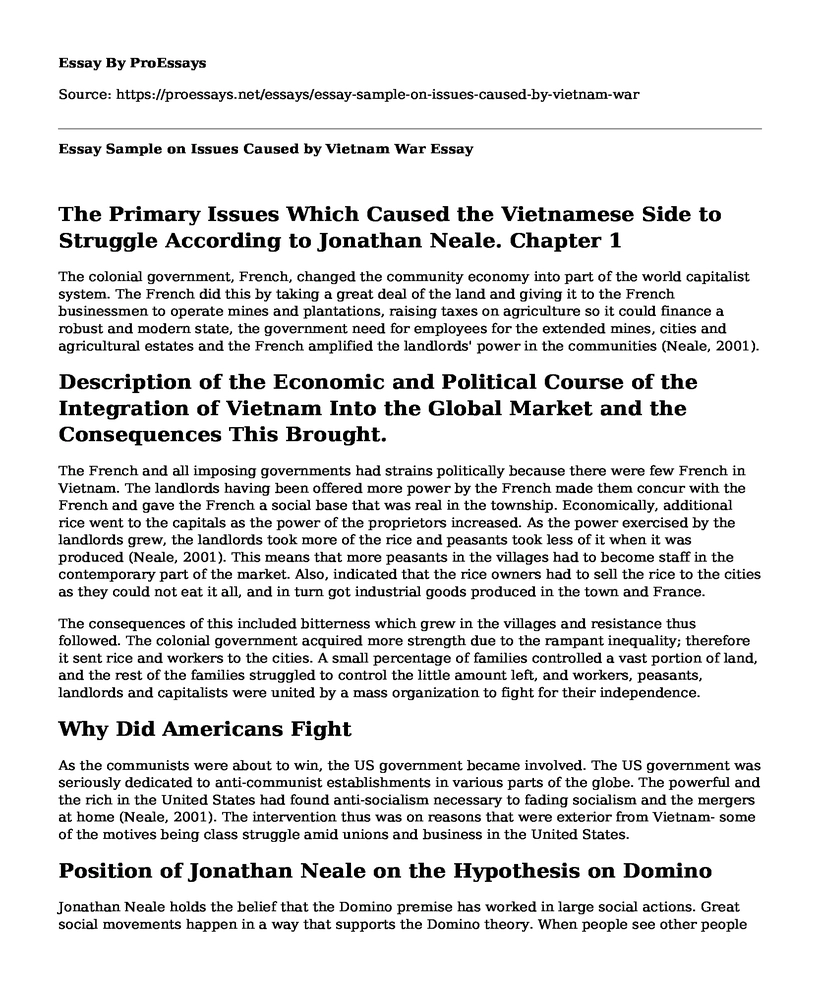The Primary Issues Which Caused the Vietnamese Side to Struggle According to Jonathan Neale. Chapter 1
The colonial government, French, changed the community economy into part of the world capitalist system. The French did this by taking a great deal of the land and giving it to the French businessmen to operate mines and plantations, raising taxes on agriculture so it could finance a robust and modern state, the government need for employees for the extended mines, cities and agricultural estates and the French amplified the landlords' power in the communities (Neale, 2001).
Description of the Economic and Political Course of the Integration of Vietnam Into the Global Market and the Consequences This Brought.
The French and all imposing governments had strains politically because there were few French in Vietnam. The landlords having been offered more power by the French made them concur with the French and gave the French a social base that was real in the township. Economically, additional rice went to the capitals as the power of the proprietors increased. As the power exercised by the landlords grew, the landlords took more of the rice and peasants took less of it when it was produced (Neale, 2001). This means that more peasants in the villages had to become staff in the contemporary part of the market. Also, indicated that the rice owners had to sell the rice to the cities as they could not eat it all, and in turn got industrial goods produced in the town and France.
The consequences of this included bitterness which grew in the villages and resistance thus followed. The colonial government acquired more strength due to the rampant inequality; therefore it sent rice and workers to the cities. A small percentage of families controlled a vast portion of land, and the rest of the families struggled to control the little amount left, and workers, peasants, landlords and capitalists were united by a mass organization to fight for their independence.
Why Did Americans Fight
As the communists were about to win, the US government became involved. The US government was seriously dedicated to anti-communist establishments in various parts of the globe. The powerful and the rich in the United States had found anti-socialism necessary to fading socialism and the mergers at home (Neale, 2001). The intervention thus was on reasons that were exterior from Vietnam- some of the motives being class struggle amid unions and business in the United States.
Position of Jonathan Neale on the Hypothesis on Domino
Jonathan Neale holds the belief that the Domino premise has worked in large social actions. Great social movements happen in a way that supports the Domino theory. When people see other people who are like them win in other countries, in particular, states that neighbour them, they become encouraged (Neale, 2001). For example, the Russian Revolution gave rise to revolutions in Germany, Hungary, Korea, Yugoslavia and Vietnam.
The Cold War Fight Was Overseas Like in Vietnam
The fight against socialism among the working class the primary action. The attack on the communists wakened the power of union locals against their management and the local democracy in the unions' thus increasing corruption of the union (Frog, 2008). It was important for the ruling class to silence socialism in the working class as a communist victory would weaken anti-communism at home.
The Military Strategy of the United State’s in Vietnam
The United States military used its massive firepower as the procedure in Vietnam (Neale, 2001). The strategy failed due to the peasant revolt where millions of peasants died but never gave up, the effect of the US peace movement and the GI revolt.
Why and How Did the Warfare Start Domestically?
The war at home began when the news on the war and the killings were made known to the people. The people wanted the war to end as the veterans in Vietnam from the US were dying in large numbers (Frog, 2008). This caused protests at home, and it was supported by all or almost the whole population in the US.
What Does Gi’s Revolt Mean? What Is Its Significance?
The GI revolt was the resistance of the GI's to engage in the war. They were being sent to missions that were going to kill them, and the superiors did not mind doing so. They refused to fight and opted to go back home. The generals thus could not send the soldiers on missions as they were unsure they could rely on their armed forces (Neale, 2001). This acts of resistance led to the conquering of the US forces against the communists.
What Does Vietnam Syndrome Mean? What Is Importance Does It Have? What Are the Consequences for American Society?
The Vietnam syndrome refers to the persistence by the more significant part of functioning Americans that the regime may not be or may be correct about the overseas course of action, but the public will not drive their offspring to die during the war (Frog, 2008). The Vietnam syndrome makes it hard for the government to use ground troops. American society thus changes the international relations nature of the Americans.
References
Frog, R. (2008). Book Review: "People's History of the Vietnam War". Maydaybookstore.blogspot.com. Retrieved 2 April 2019, from http://maydaybookstore.blogspot.com/2008/06/book-review-peoples-history-of-vietnam.html
Neale, J. (2001). A people's history of the Vietnam war. New Press.
Cite this page
Essay Sample on Issues Caused by Vietnam War. (2022, Dec 14). Retrieved from https://proessays.net/essays/essay-sample-on-issues-caused-by-vietnam-war
If you are the original author of this essay and no longer wish to have it published on the ProEssays website, please click below to request its removal:
- A Spirit Reborn
- Research Paper on Economic Causes for the Fall of the Western Roman Empire
- Mobilizing the Masses During World War II Essay
- Native American's Colonization
- Unocal Case: Revolutionizing World & Protecting Human Rights - Essay Sample
- America's Reconstruction: Addressing Inequities Since 1865 - Essay Sample
- Early US Slavery - Free Essay Example







